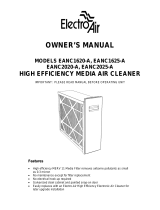The visible household dust particles, and nearly all pollen
and spore particles, therefore, can be caught and
permanently held, very easily, if you can get them to the air
cleaner. With central high efficiency air cleaners, the blower
of your heating/air conditioning system performs the air
movement function.
Continuous air cleaning will be accomplished when your
thermostat is set for continuous air circulation. If continuous
air cleaning is not required, or desired, you can manually set
your control for any time period you desire. Many
thermostats have a switch position for manual fan.
“Automatic” turns on the blower only when heating or cooling
is required. “Fan” or “manual” allows you to control blower
operation.
For those who choose periodic cleaning, (as opposed to
continuous cleaning through continuous furnace blower
operation), the most important period is during — and for
several hours after — vacuuming your home. The vacuuming
process (unless you have a central vacuum system) stirs up
a large volume of dust particles which must be drawn into
your air cleaner.
Many of the dust particles generated, while vacuuming,
are so heavy they “fall” out of the airstream before they can
be drawn out of your living area. This is why it is important to
do household dusting several hours after vacuuming.
Normally once the heavy particles “fall out”, they are only
reintroduced to the air by vacuuming, or similarly vigorous
activity.
Where allergy symptoms, which are aggravated by
pollens and spores, are a concern, continuous cleaning is
strongly encouraged.
To recap, when removing household dust is the major
benefit you are seeking, you should operate your air cleaner
during and following periods when dust is being generated or
“stirred up”. For pollens and spores which aggravate an
allergy condition, your cleaner must be operated
continuously when these pollutants are in the environment.
The air cleaner can only be effective when air containing the
contaminants is drawn through the high efficiency media.
- 5 -








